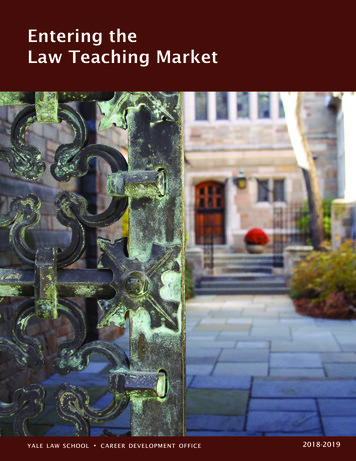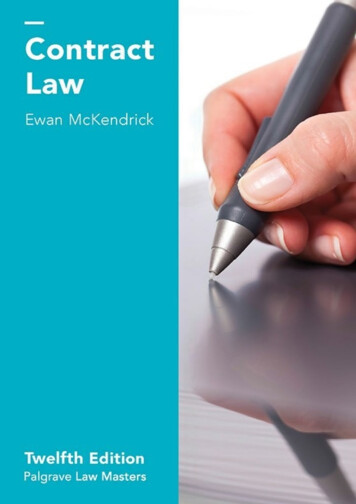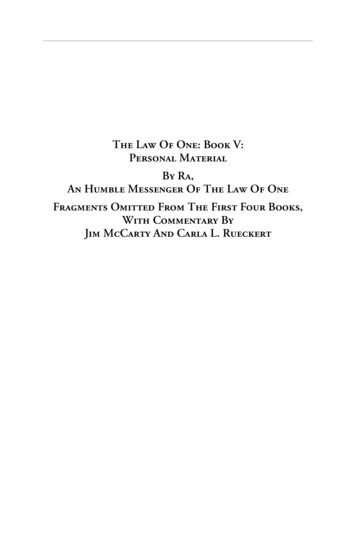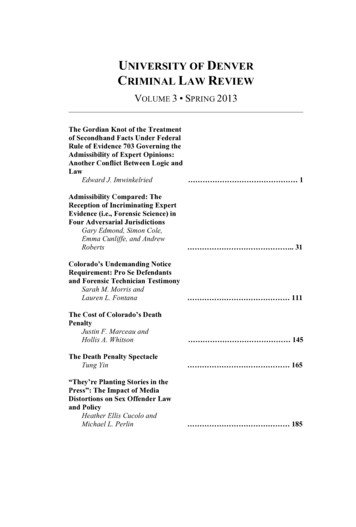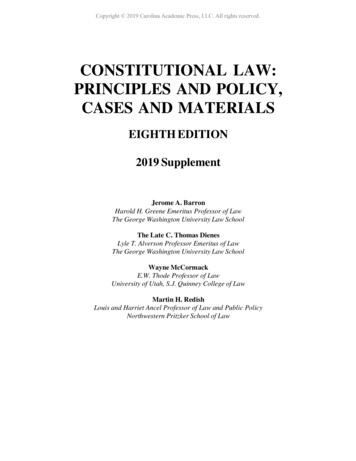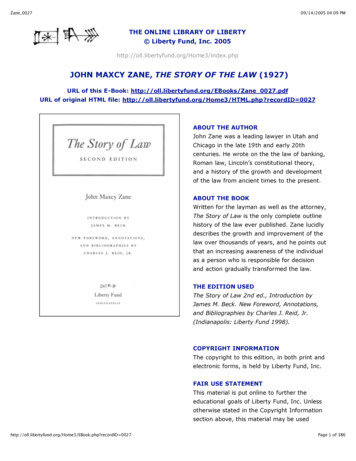
Transcription
“The Law,” “The State,” andOther Political Writings,1843–1850
The Collected Works of Frédéric BastiatJacques de Guenin, General EditorThe Man and the Statesman: The Correspondence and Articles onPolitics“The Law,” “The State,” and Other Political Writings, 1843–1850Economic Sophisms and “What Is Seen and What Is Not Seen”Miscellaneous Works on Economics: From “Jacques-Bonhomme” toLe Journal des ÉconomistesEconomic HarmoniesThe Struggle Against Protectionism: The English and French Free-TradeMovements
Frédéric Bastiat
“The Law,” “The State,” andOther Political Writings,1843–1850 frédéric bastiatJacques de Guenin, General EditorTranslated from the French byJane Willems and Michel Willemswith an introduction byPascal SalinAnnotations and Glossaries byJacques de Guenin, Jean-Claude Paul-Dejean,and David M. HartTranslation EditorDennis O’KeeffeAcademic EditorDavid M. HartLiberty Fund Indianapolis
This book is published by Liberty Fund, Inc., a foundation establishedto encourage study of the ideal of a society of free and responsible individuals.The cuneiform inscription that serves as our logo and as the design motiffor our endpapers is the earliest-known written appearance of the word “freedom”(amagi), or “liberty.” It is taken from a clay document written about 2300 b.c.in the Sumerian city-state of Lagash. 2012 by Liberty Fund, Inc.All rights reservedPrinted in the United States of Americac 10 9 8 7 6 5 4 3 2 1p 10 9 8 7 6 5 4 3 2 1Cover art: Image of the village of Mugron, France, the town where Bastiat spent mostof his adult life, from a postcard at www.communes.com / www.notrefamille.com.Library of Congress Cataloging-in-Publication DataBastiat, Frédéric, 1801–1850. [Selections. English. 2012]The Law, the State, and other political writings, 1843–1850 /Frédéric Bastiat; Jacques de Guenin, general editor;translated from the French by Jane Willems and Michel Willems;with an introduction by Pascal Salin;annotations and glossaries by Jacques de Guenin and David M. Hart;translation editor Dennis O’Keeffe.p. cm. — (Collected works of Frédéric Bastiat)Includes bibliographical references and index.isbn 978-0-86597-829-4 (hbk.: alk. paper) — isbn 978-0-86597-830-0 (pbk.: alk. paper)1. Economics. 2. Law. 3. Property. 4. France—Politics and government—1830–1848.5. France—Politics and government—1848–1852. I. Guenin, Jacques de. II. Title.hb105.b3a25 2012330—dc232012010907Liberty Fund, Inc.8335 Allison Pointe Trail, Suite 300Indianapolis, Indiana 46250-1684
ContentsGeneral Editor’s Note, ixNote on the Translation, xiNote on the Editions of the Œuvres complètes, xvAcknowledgments, xviiIntroduction, xixFrédéric Bastiat Chronology, xxxiiMap of France Showing Cities Mentioned by Bastiat, xxxivMap of Southwestern France, xxxv“The Law,” “The State,” and Other Political Writings, 1843–18501. Reflections on the Petitions from Bordeaux, Le Havre, and LyonsRelating to the Customs Service, 12. The Tax Authorities and Wine, 103. On the Wine-Growing Question, 254. Property and Law, 435. Justice and Fraternity, 606. Individualism and Fraternity, 827. The State, 938. The State (draft), 1059. The Law, 10710. Property and Plunder, 14711. Baccalaureate and Socialism, 18512. Protectionism and Communism, 23513. Plunder and Law, 26614. The War Against Chairs of Political Economy, 27715. Peace and Freedom or the Republican Budget, 28216. Discourse on the Tax on Wines and Spirits, 32817. The Repression of Industrial Unions, 348
viiiContents18. Reflections on the Amendment of M. Mortimer-Ternaux, 36219. Parliamentary Conflicts of Interest, 366Bastiat’s Political Writings: Anecdotes and Reflections, 401Glossary of Persons, 417Glossary of Places, 451Glossary of Subjects and Terms, 453Bibliographical Note on the Works Cited in This Volume, 463Bibliography, 465Index, 473
General Editor’s NoteThe six-volume Collected Works of Frédéric Bastiat will be the most complete compilation of Bastiat’s works published to date, in any country or inany language. The main source for the translation is the Œuvres complètes deFrédéric Bastiat, published by Guillaumin in the 1850s and 1860s.1Although the Guillaumin edition was generally chronological, the volumes in this series have been arranged thematically:The Man and the Statesman: The Correspondence and Articles onPolitics“The Law,” “The State,” and Other Political Writings, 1843–1850Economic Sophisms and “What Is Seen and What Is Not Seen”Miscellaneous Works on Economics: From “Jacques-Bonhomme”to Le Journal des ÉconomistesEconomic HarmoniesThe Struggle Against Protectionism: The English and FrenchFree-Trade MovementsThere are four kinds of notes in this volume: footnotes by the editor ofthe Guillaumin edition (Prosper Paillottet), which are preceded by “(Paillottet’s note)”; footnotes by Bastiat, which are preceded by “(Bastiat’s note)”;new editorial footnotes, which stand alone (unless they are commenting onPaillottet’s notes, in which case they are in square brackets following Paillottet’s note); and source notes, which are given after the title of each article.The source note consists of (1) the volume number and the beginning pagenumber as the work appears in the Œuvres complètes; (2) the original Frenchtitle; and (3) the date and place of original publication.In the text, Bastiat (as Paillottet does in the notes) makes many passing refer1. For a more detailed description of the publication history of the Œuvres complètes,see “Note on the Editions of the Œuvres complètes” and the bibliography.ix
xGeneral Editor’s Noteences to his works, for which we have provided an internal cross-referenceif the work is found in this volume. For those works not in this volume, wehave provided the location of the original French version in the Œuvres complètes (indicated in a footnote by “OC,” followed by the Guillaumin volumenumber, beginning page number, and French title of the work).In addition, we have made available two online sources for the reader to consult. The first source is a table of contents of the seven-volume Œuvres complètesand links to PDF (Portable Document Format) facsimiles of each volume. Thesecond source is our “Comparative Table of Contents of the Collected Worksof Frédéric Bastiat,” which is a table of contents of the complete Liberty Fundseries.2 Here, the reader can find the location of the English translation of thework in its future Liberty Fund volume. These contents will be filled in andupdated as the volumes are published and will eventually be the most completecomparative listing of Bastiat’s works.In order to avoid multiple footnotes and cross-references, a glossary ofpersons, a glossary of places, and a glossary of subjects and terms have beenprovided to identify those persons, places, and terms mentioned in the text.The glossaries will also provide historical context and background for thereader as well as a greater understanding of Bastiat’s work. If a name as itappears in the text is ambiguous or is found in the glossary under a differentname, a footnote has been added to identify the name as it is listed in theglossary.Finally, original italics as they appear in the Guillaumin edition have beenretained.Jacques de GueninSaint-Loubouer, France2. These two sources can be found at http://oll.libertyfund.org/person/25.
Note on the TranslationIn this translation we have made a deliberate decision not to translate Frédéric Bastiat’s French into modern, colloquial American English. Whereverpossible we have tried to retain a flavor of the more florid, Latinate forms ofexpression that were common among the literate class in mid-nineteenthcentury France. Bastiat liked long, flowing sentences, in which idea followedupon idea in an apparently endless succession of dependent clauses. For thesake of clarity, we have broken up many but not all of these thickets of expression. In those that remain, you, dear reader, will have to navigate.As was the custom in the 1840s, Bastiat liked to pepper his paragraphswith exclamations like “What!” and aphoristic Latin phrases like Quid leges sine moribus? (What are laws without customs?). We have translated thelatter and left most of the former as a reminder that Bastiat wrote in a bygone age when tastes were very different. We have also kept personal names,titles of nobility, and the like in their original French if the persons wereFrench; thus, “M.” instead of “Mr.”; “Mme” instead of “Mrs.”; “Mlle” insteadof “Miss”; and “MM” instead of “Messrs.”In the glossaries and footnotes, we have translated the French titles ofworks referred to by Bastiat or cited by the editors only if the work is wellknown to English-speaking readers, such as Montesquieu’s Spirit of the Lawsor Rousseau’s The Social Contract.Because many of the pamphlets in this volume were originally given asspeeches in the Chamber of Deputies (Bastiat was elected to the Constituent Assembly in April 1848 and to the Legislative Assembly in May 1849)and because Bastiat did not live to edit them into a final publishable form,the language can be at times rather colloquial and informal. One needs toremember that the speeches were given in the heat of the revolutionary moment, when France was undergoing considerable upheaval and the liberalforces Bastiat represented were under siege from both the conservatives andthe protectionists on the right and the socialists on the left. Other essaysxi
xiiNote on the Translationin the volume were prepared for publication in such journals as Le Journaldes débats, Le Journal des économistes, or Le Libre-échange and were thus ina more polished form. A handful of writings in the volume were publishedprivately by Bastiat as “pamphlets,” which he handed out to his friends, orwere submissions to parliamentary committees on various topical matters.Thus, the language he used varied considerably from pamphlet to pamphletdepending on its raison d’être. It is therefore possible that both the originalFrench editor (Paillottet) as well as the translation in this edition have giventoo final a form to what were in fact ephemeral pamphlets du jour.Concerning the problematical issue of how to translate the French wordla liberté—whether to use the more archaic-sounding English word libertyor the more modern word freedom—we have let the context have the finalsay. Bastiat was much involved with establishing a free-trade movement inFrance and to that end founded the Free Trade Association (Associationpour la liberté des échanges) and its journal Le Libre-échange. In this contextthe word choice is clear: we must use freedom because it is intimately linkedto the idea of “free trade.” The English phrase “liberty of trade” would soundawkward. Another word is pouvoir, which we have variously translated as“power,” “government,” or “authority,” again depending on the context.A third example consists of the words économie politique and économiste.Throughout the eighteenth century and most of the nineteenth, in bothFrench and English the term political economy was used to describe whatwe now call “economics.” Toward the end of the nineteenth century as economics became more mathematical, the adjective “political” was droppedand not replaced. We have preferred to keep the term political economy bothbecause it was still current when Bastiat was writing and because it betterdescribes the state of the discipline, which proudly mixed an interest inmoral philosophy, history, and political theory with the main dish, whichwas economic analysis; similarly, with the term économiste. Today one canbe a free-market economist, a Marxist economist, a Keynesian economist,a mathematical economist, or an Austrian economist, to name a few. Thequalifier before the noun is quite important. In Bastiat’s day it was assumedthat any “economist” was a free-market economist, and so the noun neededno adjectival qualifier. Only during the 1840s, with the emergence of socialist ideas in France and Germany, did there arise a school of economic thinking that sharply diverged from the free market. But in Bastiat’s day this hadnot yet become large enough to cause confusion over naming. Even in 1849,when Gustave de Molinari published his charming set of dialogues, Les Soi-
Note on the Translationxiiirées de la rue Saint-Lazare, between three stock characters—the socialist,the conservative, and the economist—it was perfectly clear who was arguingfor what, and that the economist was, of course, a laissez-faire, free-marketeconomist.A particularly difficult word to translate is l’industrie, as is its related termindustriel. In some respects it is a “false friend,” as one is tempted to translateit as “industry” or “industrious” or “industrial,” but this would be wrongbecause these terms have the more narrow modern meaning of “heavy industry” or “manufacturing” or “the result of some industrial process.” Themeaning in Bastiat’s time was both more general and more specific to a particular social and economic theory current in his day.The word industry in the eighteenth century had the general meaningof “productive” or “the result of hard work,” and this sense continued to becurrent in the early nineteenth century. Industry also had a specific meaning,which was tied to a social and economic theory developed by Jean-BaptisteSay and his followers Charles Comte and Charles Dunoyer in the 1810s and1820s, as well as by other theorists such as the historian Augustin Thierry.According to these theorists there were only two means of acquiring wealth:by productive activity and voluntary exchanges in the free market (that is,by “industrie”—which included agriculture, trade, factory production, andservices) or by coercive means (conquest, theft, taxation, subsidies, protection, transfer payments, or slavery). Anybody who acquired wealth throughvoluntary exchange and productive activities belonged to a class of peoplecollectively called les industrieux, in contrast to those individuals or groupswho acquired their wealth by force, coercion, conquest, slavery, or government privileges. The latter group were seen as a ruling class or as “parasites”who lived at the expense of les industrieux.Bastiat was very much influenced by the theories of Say, Comte, andDunoyer and adopted their terminology regarding industry. So to translateindustrie in this intellectual context as “production” (or some other modern,neutral term) would be to ignore the resonance the word has within thesocial and economic theory that was central to Bastiat’s worldview. Hence,at the risk of sounding a bit archaic and pedantic we have preferred to useindustry in order to remain true to Bastiat’s intent.Bastiat uses the French term la spoliation many times in his writings. Itis even used in the title of two of his pamphlets (found in this volume),“Propriété et spoliation,” published in July 1848 in Le Journal des débats;and “Spoliation et loi,” published in May 1850 in Le Journal des économistes.
xivNote on the TranslationThe Oxford English Dictionary defines spoliation as “the action of ruiningor destroying something” and “the action of taking goods or property fromsomewhere by illegal or unethical means”—from the Latin verb spoliare(strip, deprive). In using this term, Bastiat is making the point that there isa distinction between the two ways in which wealth can be acquired, eitherthrough peaceful and voluntary exchange (i.e., the free market) or by theft,conquest, and coercion (i.e., using the power of the state to tax, repossess,or grant special privileges). Some earlier translations of Bastiat use the olderword spoliation; the word plunder is also used on occasion. In our translationwe have preferred to use plunder. Another possible translation for spoliationis “exploitation,” which carries much the same meaning but has an unfortunate association with Marxist theories of “capitalist exploitation.”A final note on terminology: in Bastiat’s time, the word liberal had thesame meaning in France and in America. In the United States, however, themeaning of the word has shifted progressively toward the left of the politicalspectrum. A precise translation of the French word would be either “classical liberal” or “libertarian,” depending on the context, and indeed Bastiat isconsidered a classical liberal by present-day conservatives and a libertarianby present-day libertarians. To avoid the resulting awkwardness, we have decided by convention to keep the word liberal, with its nineteenth-centurymeaning, in the translations as well as in the notes and the glossaries.David M. Hart
Note on the Editions of the Œuvres complètesThe first edition of the Œuvres complètes appeared in 1854–55, consistingof six volumes.1 The second edition, which appeared in 1862–64, was analmost identical reprint of the first edition (with only minor typesetting differences) but was notable for the addition of a new, seventh volume, whichcontained additional essays, sketches, and correspondence.2 The second edition also contained a preface by Prosper Paillottet and a biographical essayon Bastiat by Roger de Fontenay (“Notice sur la vie et les écrits de FrédéricBastiat”), both of which were absent in the first edition.Another difference between the first and second editions was in the sixthvolume, which contained Bastiat’s magnum opus, Economic Harmonies. Thefirst edition of the Œuvres complètes described volume 6 as the “third revised and augmented edition” of Economic Harmonies. This is somewhatconfusing but does have some logic to it. The “first” edition of EconomicHarmonies appeared in 1850 during the last year of Bastiat’s life but in an incomplete form. The “second” edition appeared in 1851, after his death, editedby “La Société des amis de Bastiat” (most probably by Prosper Paillottet andRoger de Fontenay) and included the second half of the manuscript, whichBastiat had been working on when he died. Thus the edition that appearedin the first edition of the Œuvres complètes was called the “third” edition onits title page. This practice continued throughout the nineteenth century,with editions of Economic Harmonies staying in print as a separate volume as1. Œuvres complètes de Frédéric Bastiat, mises en ordre, revues et annotées d’après lesmanuscrits de l’auteur (Paris: Guillaumin, 1854–55). 6 vols.: vol. 1, Correspondance etmélanges (1855); vol. 2, Le Libre-échange (1855); vol. 3, Cobden et la Ligue ou L’Agitationanglaise pour la liberté des échanges (1854); vol. 4, Sophismes économiques. Petitspamphlets I (1854); vol. 5, Sophismes économiques. Petits pamphlets II (1854); vol. 6,Harmonies économiques (1855). [Edited by Prosper Paillottet with the assistance of Rogerde Fontenay, but Paillottet and Fontenay are not credited on the title page.]2. Vol. 7: Essais, ébauches, correspondance (1864).xv
xviNote on the Editions of the Œuvres complèteswell as being included as volume 6 in later editions of the Œuvres complètes.By 1870–73, therefore, when the third edition of the Œuvres complètes appeared, the version of Economic Harmonies in volume 6 was titled the “sixth”edition of the work.Other “editions” of the Œuvres complètes include a fourth edition, 1878–79, and a fifth edition, 1881–84. If there was a sixth edition, the date is unknown. A seventh edition appeared in 1893, and a final edition may haveappeared in 1907. (For a complete listing of the editions of the Œuvres complètes that were used in making this translation, see the bibliography.)David M. HartAcademic Editor
AcknowledgmentsThis translation is the result of the efforts of a team comprising Jane Willems and Michel Willems; Dr. Dennis O’Keeffe, Professor of Social Scienceat the University of Buckingham and Senior Research Fellow at the Instituteof Economic Affairs in London, who carefully read the translation and madevery helpful suggestions at every stage; Dr. David M. Hart, Director of theOnline Library of Liberty Project at Liberty Fund, who supplied much ofthe scholarly apparatus and provided the translation with the insights of ahistorian of nineteenth-century European political economy; Dr. AurelianCraiutu, Professor of Political Science at Indiana University, Bloomington,who read the final translation and contributed his considerable knowledgeof nineteenth-century French politics to this undertaking; Dr. Robert Leroux of the University of Ottawa for additional assistance with the translation; and Dr. Laura Goetz, senior editor at Liberty Fund, who organized andcoordinated the various aspects of the project from its inception through tofinal manuscript.I would also like to acknowledge the contribution of Mr. Manuel Ayau(1925–2010), a Liberty Fund board member whose support and enthusiasmfor the translation project was crucial in getting it off the ground.This volume thus has all the strengths and all the weaknesses of a voluntary, collaborative effort. My colleagues and I hope that Bastiat wouldapprove, especially as no government official was involved at any stage.Jacques de GueninGeneral editorFounder of the Cercle Frédéric Bastiat
IntroductionThe pamphlets and articles in this volume clearly show Frédéric Bastiat tobe a keen observer and analyst of the political and economic problems of histime. Many of the pamphlets were written while he was an active politician,a position he held unfortunately for only a short period of time. Bastiat waselected to the Constituent Assembly in April 1848 and then to the Legislative Assembly in May 1849 but died on Christmas Eve in 1850, at the age offorty-nine.1Despite his brief life, Bastiat was a privileged witness to a particularly unsettled period of French history: after the Revolution of 1789 came a periodof political chaos, followed by the Napoleonic Empire, the return of themonarchy in 1815, a revolution in 1830, and another one in 1848, at whichdate the Second Republic was founded and universal suffrage adopted forthe first time in French history. It was also during this period that the “bourgeoisie” became an increasingly influential social class that made possible,after the death of Bastiat, the takeoff of economic growth under EmperorNapoléon III and the beginnings of industrialization in Britain and France.These were the events that provided the background for Bastiat’s numerouswritings on economics and politics.The Political Pamphlets as Modelsof Applied EconomicsBastiat was both a thinker and an actor in public affairs. He was a politician who was inspired by both economic and ethical principles, which is a1. It is not clear exactly what killed Bastiat. We know from his correspondence that hehad a painful throat condition of some kind, which was probably tuberculosis but couldalso have been throat cancer. Whatever it was that finally killed him, Bastiat died at thepeak of his powers as a writer and a politician.xix
xx Introductionrare occurrence, whether then or now. Next to Bastiat “the economist,” whowrote such monumental theoretical works as Economic Harmonies (1850),we have Bastiat the “political pamphleteer,” who wrote in response to thepolitical and economic battles of the moment.2 To those economists whodream of attempting to implement their ideas, political life might seem attractive; however, only a very few, like Bastiat, are lucky enough to get thatopportunity. While France was wracked by wave after wave of revolutionarychange between 1848 and 1850, Bastiat had the chance to present his ideasin speeches to the Assembly, in broadsides handed out in the street, as essaysin popular journals, and as articles in academic journals.Throughout the pamphlets, Bastiat demonstrates how the combinationof careful logic, consistency of principle, and clarity of exposition is theinstrument for solving most economic and social problems. He does nothesitate to present facts and even statistics to his readers, but he does so in amanner that is understandable and coherent because the material is analyzedthrough the filter of rigorous economic theory.3In this volume the reader will find discussions covering a wide variety oftopics, such as the theory of value and rent (in which Bastiat made pathbreaking contributions), public choice and collective action, regulations,taxation, education, trade unions, price controls, capital and growth, andthe balance of trade, many of which topics are still at the center of politicaldebate in our own time. Far from being dry and technical discussions ofabstruse matters, all Bastiat’s pamphlets are written with such outstandinglimpidity that reading them is a joy.Eyewitness to Political and EconomicUpheavals (1848–50)After a period as a successful provincial magistrate, Bastiat was elected inthe immediate aftermath of the February revolution of 1848 to the Constituent Assembly in Paris. He represented his home département (the Landes,2. A future volume will contain Bastiat’s “economic” pamphlets, better known asEconomic Sophisms, but it must be understood that in Bastiat’s writing there is no hardand fast barrier between politics, ethics, and economic theory. He moves from one tothe other with great ease.3. See, for example, the interesting way in which Bastiat is able to explain the povertyof vine growers in his province by referring to the effects of taxation and protectionismin “Discourse on the Tax on Wines and Spirits,” p. 328.
Introductionxxilocated in the southwest region of France) and became active in opposingboth the socialism of the left and the authoritarianism of the right. As a classical liberal advocate of natural rights, universal franchise, the ultraminimalist state, and absolute free trade, Bastiat was not completely at home on theright or on the left side of the Assembly, though he often sat on the left because of his opposition to many of the establishment’s policies. On the rightsat the monarchists, militarists, large landowners, supporters of the very limited voting franchise, and business interests who advocated tariff protectionand subsidies. Occupying the left were the republicans, democrats, socialists,and advocates of state-supported make-work schemes and other subsidies tothe poor. As some of his speeches indicate, Bastiat could cleverly play off oneside against the other, appealing to the right in his attacks on socialism butappealing to the left in his support of the republic and his criticism of statesubsidies to the rich.In 1846 a key economic reform occurring in Britain caught Bastiat’s attention: Prime Minister Robert Peel’s abolition of the Corn Laws.4 The repeal ofthese laws eliminated many price controls on imported food stuffs and thuslowered the cost of food for those British consumers who were the least welloff. The person behind the successful repeal was Richard Cobden whoseorganization, the Anti– Corn Law League, mobilized British opinion andforced Peel to act as he did. Bastiat, impressed with this popular and successful movement, very much wanted to emulate Cobden’s success by organizing a homegrown French free-trade movement and spent much of his timeduring the mid-1840s trying to bring this about, with disappointing results.5 Toward the end of his life, as a deputy in the Constituent Assembly andthen in the Legislative Assembly, Bastiat became immersed in the strugglesagainst the rise of socialist groups from the left and the opportunistic, interventionist policies of other groups on the right. Many of his pamphletsfrom this period were economic in nature and designed to alert people tothe dangers of growing government intervention in the economy and attackson the rule of law. The pamphlets are period pieces to the extent that they4. See the entry for the “Anti–Corn Law League” in the Glossary of Subjects andTerms.5. A future volume will contain Bastiat’s writings on the free-trade movements inBritain and France.
xxii Introductionreflect the day-to-day or week-to-week battles for liberty fought by Bastiatin the Assembly (he served on a budget committee and thus had access toimportant economic data). However, they are also timeless works of appliedeconomic theory that still stand today as insightful, informative, and evenexemplary forms of their kind.Republicanism and Universal SuffrageBastiat was a “sincere” republican in the sense that he favored a republican system of government (as opposed to a monarchical one) and, moreprecisely, because he favored universal suffrage. Yet he was also aware of thedangers of unrestrained democracy if it were allowed to violate the people’srights to property (“plunder”) and liberty (“slavery”). In his famous pamphlet “The Law” (1850) Bastiat explains that the law, far from being whatit ought to be, namely the instrument that enabled the state to protect individuals’ rights and property, had become the means for what he termed“spoliation,” or plunder.As the will and the capacity to legislate became commonplace—the resultof universal suffrage—plunder, too, became commonplace. Bastiat’s viewson law and plunder are both modern and prophetic, given that democracywas a relatively new experience in France. Like his contemporary Alexis deTocqueville, Bastiat was an astute observer of the society of his time as wellas a visionary of what unrestrained democracy might lead to, as the following passage shows:Whatever the disciples of the Rousseau school think, those who say thatthey are very advanced and whom I believe to be retarded by twentycenturies, universal suffrage (taking this word in its strictest sense) is notone of the sacred dogmas with regard to which any examination or evendoubt is a crime.6Bastiat points out the logical contradiction of the Rousseauean lawmakers who believed that ordinary citizens are naturally inclined to makebad choices in their own lives (but not in choosing their political representatives apparently), so that they must be deprived of their freedom, whereas theelected rulers of society would necessarily be inclined to make good choices6. “The Law,” p. 112. Italics in the original. pag
The six- volume Collected Works of Frédéric Bastiat will be the most com-plete compilation of Bastiat's works published to date, in any country or in any language. The main source for the translation is the Œuvres complètes de Frédéric Bastiat, published by Guillaumin in the 1850s and 1860s.1





